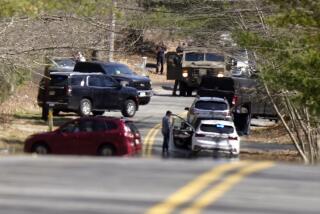Documents Tell How Consultant Guaranteed Job
- Share via
WASHINGTON — One late September day in 1987, Alexandria, Va.-based defense consultant Mark C. Saunders called Varian Continental Electronics Inc. executive Joe Bradley in Dallas with an enticing proposition, according to federal court documents disclosed Thursday.
Saunders, who had been retained by an Arlington, Va., company to draft a transmitter contract for the Pentagon, told Bradley that he could write the proposal in a way that would guarantee Varian the job, the documents say.
The offer provided Varian a way to overcome what was widely regarded as Pentagon dissatisfaction with its transmitter work and Bradley was intrigued, the federal affidavit indicated.
So were FBI agents listening in to the conversation.
As federal agents listened in for the next two months on court-approved wiretaps, the consultant and the executive spoke often by phone and arranged a swap of information for money in a scheme investigators have said is characteristic of the broader pattern of Pentagon contract fraud now under scrutiny.
The account is contained in affidavits filed by the U.S. attorney in Dallas to justify searches of Bradley’s office at Varian in Dallas and of Saunders’ home in Alexandria.
Mask Arrangement
At one point, portions of the affidavits say, Bradley suggested that they “wash,” or hide, Varian’s payments to the consultant by passing them through Marilyn A. Burgess, who was Saunders’ live-in companion and the vice president of Saunders’ firm, Acquisition Control Limited. Ultimately they agreed to mask the arrangement by billing the work as if it were done for an unrelated Varian contract for the Voice of America.
And they agreed on absolute secrecy. “(I) will promise you that draft will not leave this . . . office,” Bradley told Saunders later in that November conversation, urging him to send a copy of the contract proposal he was drafting that would steer the contract to Varian.
Before setting up the deal, Saunders--who had worked as a consultant for Varian under other contracts after being fired from the Pentagon in June, 1982, for taking part in an insider-trading scheme--shared with a friend his perception of the company:
“If I thought (the Defense Department) was corrupt,” he said, “it is absurd the way these people operate.”
Bradley, vice president for marketing at Varian Continental Electronics Inc. in Dallas, had not previously been named as one of the figures under scrutiny in the fraud investigation. Efforts to reach Bradley were not successful, and it was not known if he had hired a lawyer.
A spokesman at Varian’s corporate headquarters in Palo Alto, Gary Simpson, said Bradley had been placed on administrative leave until the investigation was complete.
“We do not believe the company was involved in any criminal misconduct,” Simpson said in a prepared statement. “We have been advised that Continental Electronics is not a target of the investigation.”
Saunders’ attorney, David P. Towey, read the affadavit late Thursday and declined to comment on any of the specific allegations.
“But I have to note that none of the conversations described showed any evidence of payoffs to government officials,” Towey said. “It’s also hard to tell how many of these conversations described simply reflect standard efforts to show a knowledge of how the procurements are operated.”
According to the affidavit, the arrangement between Saunders and Bradley was forged after Saunders was hired by C-Cubed Corp. of Arlington to assist a division of the Navy--the Space and Naval Warfare Systems Command (SPAWAR)--in developing a strategy to acquire transmitters.
The job paid Saunders only $9,000. But it put him in a position of great value to Varian Continental in Dallas, which already had a transmitter contract but knew the Navy was not happy with its work.
Saunders also had connections that made him even more valuable.
Before being fired from the Navy in 1982, when he pleaded guilty to charges of using confidential information from his job to profit on the stock market, Saunders had been a division head of SPAWAR.
Close to Stone
He knew how the contract system worked. He also was close to his successor, George G. Stone, who the affidavit says provided inside information to Saunders about other Pentagon projects.
The affidavit does not draw a direct connection between Stone and Saunders on the Varian project. But it alleges that Saunders offered Bradley access to inside information about the transmitter project that the Varian executive wanted very badly.
Bradley invited Saunders to meet with him in Dallas after Saunders first told him that they needed to have “a sensitive, confidential meeting” to discuss information that he had in his possession, the affidavit said. He later offered to discuss compensation when Saunders told him he could “write the plan biased one way or another.”
The consultant later told Bradley that the work required that he obtain “closed data” and thus would require more money. Bradley offered him a bonus, the documents say.
In a later conversation with Saunders, Bradley mentioned the “secret, not to be looked at by anyone else” document that he had in his possession.
That was among the evidence sought by the FBI in what a company spokesman described as a “friendly but firm” search of Varian earlier this month.
Varian purchased Continental Electronics, which makes high-powered radio transmitters for communications, radar and energy research, in 1985. Before that, the company was privately held.
The Dallas-based division’s sales are believed to be less than $50 million annually, and are split between civilian and defense buyers. The division, which employs about 500 workers, often serves as a subcontractor on communications equipment programs for the Department of Defense.
More to Read
Inside the business of entertainment
The Wide Shot brings you news, analysis and insights on everything from streaming wars to production — and what it all means for the future.
You may occasionally receive promotional content from the Los Angeles Times.










